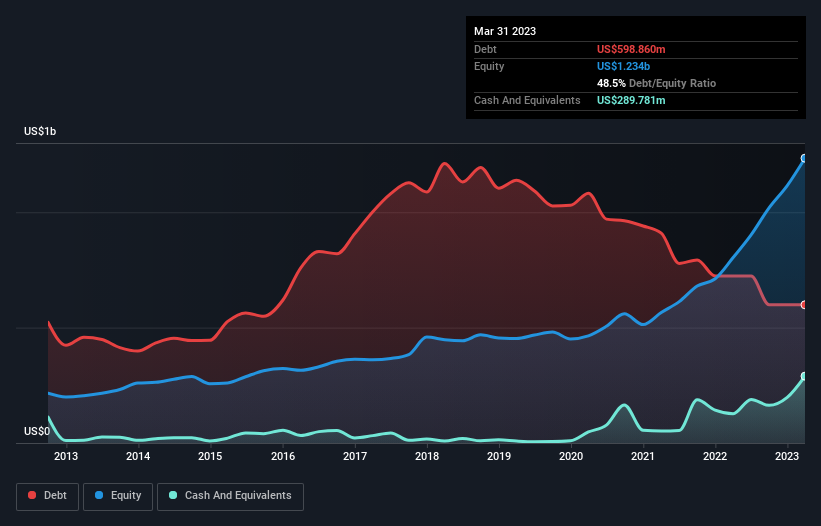- United States
- /
- Beverage
- /
- NasdaqGS:COKE
We Think Coca-Cola Consolidated (NASDAQ:COKE) Can Manage Its Debt With Ease

The external fund manager backed by Berkshire Hathaway's Charlie Munger, Li Lu, makes no bones about it when he says 'The biggest investment risk is not the volatility of prices, but whether you will suffer a permanent loss of capital.' So it seems the smart money knows that debt - which is usually involved in bankruptcies - is a very important factor, when you assess how risky a company is. As with many other companies Coca-Cola Consolidated, Inc. (NASDAQ:COKE) makes use of debt. But is this debt a concern to shareholders?
When Is Debt A Problem?
Debt is a tool to help businesses grow, but if a business is incapable of paying off its lenders, then it exists at their mercy. Part and parcel of capitalism is the process of 'creative destruction' where failed businesses are mercilessly liquidated by their bankers. While that is not too common, we often do see indebted companies permanently diluting shareholders because lenders force them to raise capital at a distressed price. Having said that, the most common situation is where a company manages its debt reasonably well - and to its own advantage. When we think about a company's use of debt, we first look at cash and debt together.
Check out our latest analysis for Coca-Cola Consolidated
What Is Coca-Cola Consolidated's Net Debt?
As you can see below, Coca-Cola Consolidated had US$598.9m of debt at March 2023, down from US$723.6m a year prior. However, because it has a cash reserve of US$289.8m, its net debt is less, at about US$309.1m.

A Look At Coca-Cola Consolidated's Liabilities
Zooming in on the latest balance sheet data, we can see that Coca-Cola Consolidated had liabilities of US$812.6m due within 12 months and liabilities of US$1.75b due beyond that. Offsetting these obligations, it had cash of US$289.8m as well as receivables valued at US$638.2m due within 12 months. So its liabilities total US$1.64b more than the combination of its cash and short-term receivables.
Coca-Cola Consolidated has a market capitalization of US$5.88b, so it could very likely raise cash to ameliorate its balance sheet, if the need arose. However, it is still worthwhile taking a close look at its ability to pay off debt.
We use two main ratios to inform us about debt levels relative to earnings. The first is net debt divided by earnings before interest, tax, depreciation, and amortization (EBITDA), while the second is how many times its earnings before interest and tax (EBIT) covers its interest expense (or its interest cover, for short). This way, we consider both the absolute quantum of the debt, as well as the interest rates paid on it.
Coca-Cola Consolidated's net debt is only 0.35 times its EBITDA. And its EBIT easily covers its interest expense, being 35.5 times the size. So you could argue it is no more threatened by its debt than an elephant is by a mouse. On top of that, Coca-Cola Consolidated grew its EBIT by 47% over the last twelve months, and that growth will make it easier to handle its debt. There's no doubt that we learn most about debt from the balance sheet. But it is Coca-Cola Consolidated's earnings that will influence how the balance sheet holds up in the future. So if you're keen to discover more about its earnings, it might be worth checking out this graph of its long term earnings trend.
But our final consideration is also important, because a company cannot pay debt with paper profits; it needs cold hard cash. So we clearly need to look at whether that EBIT is leading to corresponding free cash flow. Over the most recent three years, Coca-Cola Consolidated recorded free cash flow worth 64% of its EBIT, which is around normal, given free cash flow excludes interest and tax. This cold hard cash means it can reduce its debt when it wants to.
Our View
Happily, Coca-Cola Consolidated's impressive interest cover implies it has the upper hand on its debt. And the good news does not stop there, as its EBIT growth rate also supports that impression! Zooming out, Coca-Cola Consolidated seems to use debt quite reasonably; and that gets the nod from us. After all, sensible leverage can boost returns on equity. Above most other metrics, we think its important to track how fast earnings per share is growing, if at all. If you've also come to that realization, you're in luck, because today you can view this interactive graph of Coca-Cola Consolidated's earnings per share history for free.
At the end of the day, it's often better to focus on companies that are free from net debt. You can access our special list of such companies (all with a track record of profit growth). It's free.
New: AI Stock Screener & Alerts
Our new AI Stock Screener scans the market every day to uncover opportunities.
• Dividend Powerhouses (3%+ Yield)
• Undervalued Small Caps with Insider Buying
• High growth Tech and AI Companies
Or build your own from over 50 metrics.
Have feedback on this article? Concerned about the content? Get in touch with us directly. Alternatively, email editorial-team (at) simplywallst.com.
This article by Simply Wall St is general in nature. We provide commentary based on historical data and analyst forecasts only using an unbiased methodology and our articles are not intended to be financial advice. It does not constitute a recommendation to buy or sell any stock, and does not take account of your objectives, or your financial situation. We aim to bring you long-term focused analysis driven by fundamental data. Note that our analysis may not factor in the latest price-sensitive company announcements or qualitative material. Simply Wall St has no position in any stocks mentioned.
About NasdaqGS:COKE
Coca-Cola Consolidated
Manufactures, markets, and distributes nonalcoholic beverages primarily products of The Coca-Cola Company in the United States.
Excellent balance sheet with proven track record and pays a dividend.


